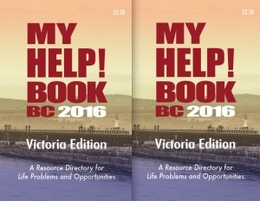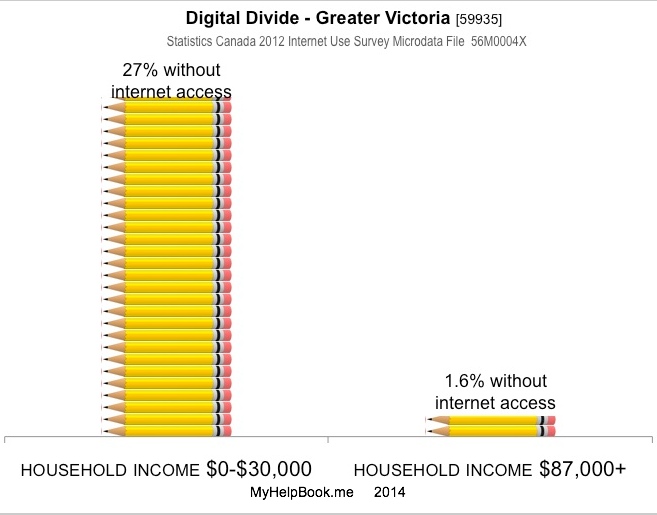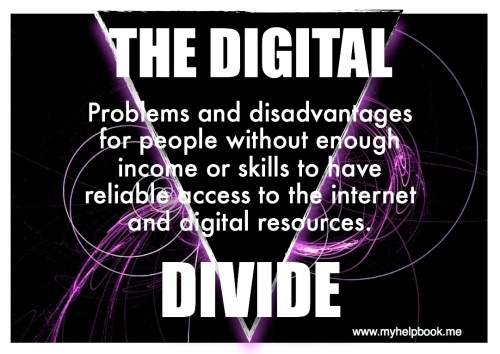 There are many organizations that offer help to the public, yet the public might not be aware that these resources are available to them. If people don't know these resources exist, they can't know to search for them. Finding help quickly and easily with issues like unemployment, divorce, mental health or insolvency can be crucial for many people in those situations. Letting people know their rights and entitlements, including monetary benefits, housing and legal counsel can make the difference between people being overcome by problems, or being able to prevent and surmount them. People who want to volunteer to give something back to their community, to start a business, or to find learning opportunities can all benefit from knowing about community and government resources. Despite the popularity of searching for information online, the existence of many useful resources remains obscure as they have only a cursory presence online or are poorly promoted. For people needing help because they are experiencing a personal or family crisis, or they are looking to make a life change, the Internet can and does fall short - assuming those in need can even get online. This is commoner than you think: Canada's telecoms services are among the most expensive worldwide and 27% of people with incomes under $30,000 yearly in Victoria lack Internet access. But even if someone is online, using the internet to find information is a skill in itself. Many elderly people, or those with sight or literacy problems, lack computer skills or are technophobic. Given how contact details such for many helping organizations are buried in a small corner of a bewilderingly large or complex website, the internet is far from ideal. Those belonging to vulnerable groups who are most in need of assistance - the impoverished, elderly, disabled, and newcomers to an area - stand the greatest risk of missing out. At a recent talk (January 2016*) the new B.C. Ombudsperson reported that their office receives many phone calls from people who are simply unsure of where to turn for help with a problem. Phone still remains the most popular method of contact over email and online forms. Clearly we have a problem -- even though community resources exist, too many people remain unaware or unable to reach out.  My Help Book BC offers a simple way to help people learn about important community information that may prove crucial to help them or someone they care about. Check here for more information on purchase locations. Bulk discounts and free copies are also available. *Jay Chalke, January 13, 2016, OAP meeting Victoria BC
0 Comments
The digital divide can be broadly described as the gap between those with good access to the internet and those without, or, more precisely: "consumer disparities in access to information and communication technologies." * This gap, not surprisingly, is biggest for those who have the smallest incomes. A 2012 Statistics Canada survey (CANSIM Table 358-0152) shows that in Greater Victoria the top income group of $87,000+ (per year) has 98.4 percent internet access and 1.6 percent without. The lowest income group of $0-$30,000 has a significant 27 percent without internet access. A similar but slightly smaller gap exists in Metro Vancouver. The lowest income group has 20.9 without internet access compared to 9.5 without for the highest income group. Canada-wide it is 5 percent without access for highest income group and 38 percent without for the lowest income group (attributed to more rural/urban differences). Larry Gagnon is a long-time volunteer with "Find a Computer A Home" in Victoria which has been providing low income people in Victoria with good quality donated used computers for the last 20 years. Recently he's seen a drop in requests for free computers (which have become more affordable), however, the bigger problem is lack of affordable home internet service. This is evident in the number of people who use public computers at cafes, community centres, job centres, and libraries. "There is heavy usage of public computers all the time, all day, and at all branches," says Kate Pollock of the Greater Victoria Public Library who tracks of public computer use for the GVPL (available to library card holders for one hour at a time, and a maximum of two hours a day). She emphasizes: "It's our mandate to bridge the digital divide and provide equal opportunity for information access for everybody. The internet is part of that." Greater Victoria Public Library stats: As a one-day snapshot of public computer use, on Friday, April 25th there were 743 sessions (each session is a separate person's log-in) throughout the GVPL's ten branches (a total of 644 online hours). In one month (March 2014) there were 22,578 sessions all ten branches: the busiest being Central downtown 9,573, then Saanich 2,122, Esquimalt 1,751, Nellie McClung 1600 and Oak Bay 1,600. For the year of 2013, there were a total of 247,610 sessions system-wide. Source: Kate Pollock, Customer Service Coordinator, Greater Victoria Public Library. Lack of internet access is a huge barrier for people who need to find help online or who need to apply for jobs, programs or benefits. Less obvious but more poignant is the impact on isolated people who might also lack transportation or mobility and who are desperate to stay in touch with friends and family. And politically, the digital divide is a double democracy whammy: lack of access to information (being informed) and lack of ability to give information (having your voice heard). Larry from 'Find a Computer A Home' gets many phone calls from grateful people who want to let him know what a huge difference having a computer has made in their lives. The most commonly stated benefits are: a) it helped them find employment; b) it allowed them to stay connected with family; c) it allowed them to learn practical computer skills and d) it gave them enjoyment of learning. A digital divide however, is not just lack of computers and internet access. There are other less obvious barriers to online access:
During the development of My Help Book, the most frequently asked question was: “why are you publishing a paper guide?” This reflects the widely held assumption that everyone has easy access to the internet and it shows how the digital divide is mostly an invisible problem –especially when other social problems are more visible and urgent. That public computer terminals in libraries are full to bursting from opening time to closing time demonstrates the size of this invisible problem. More Resources and Information:
*Digital Divide definition: "consumer disparities in access to information and communication technologies based on age, gender, race and socio-economic characteristics and geographic location." Seçkin, G. (2010). Digital Diversity or Digital Divide: An Exploratory Research on Age, Gender, Race and Income Characteristics of Online Health Information Users. International Journal of Diversity in Organisations, Communities & Nations, 10(1), 99-116; cited in 'Closing the Digital Divide and Its impact on Minorities' (PDF). Written in 2014, updated 2016 As the My Help Book key community resource guide was being developed, the most frequent question asked was: "Why are you publishing a paper version and not just a digital version online and a smart phone app?"
Here are the reasons: First: There will be a digital version for the people who strive to be paper-free in 2015. Most paper-free strivers are tech-loving forward-thinkers who want to do what is good for the environment. However, there are environmental costs to high tech gadgets but most of these costs are invisible to the consumer, unlike paper, which causes clutter and recycling chores. So it is not quite a simple equation of paper-free = good for environment and paper products = bad. Second: Despite the image of everyone walking around with smart phones, tablets and laptops, and widely available free wifi, there exists a ‘ digital divide’ which is a barrier to people who need to find help and information or even to apply for certain benefits. "The digital divide remains consistent across all demographics with wealthier households far likelier to use the Internet than poorer ones regardless of their age. For example, Statscan reports that 47.5 per cent of Canadians aged 65 and over use the Internet (up from 40.2 in 2010), the biggest jump of any age group. However, there is a major divide in Internet use based on household income. While 66.7 per cent of households over the age of 65 in the top half of income use the Internet, that number drops to only 28.5 per cent for the poorest quartile of households." Michael Geist, Toronto Star, Friday, Nov.1st, 2013 There are 5 reasons people still have barriers to internet access:
Third: Some people simply prefer paper; they find it easier to flip through and browse information on paper instead of on a computer screen. They also like to write notes in margins (there are several blank lined pages meant for the user in My Help Book). In talking to people during the development of My Help Book, I found that those who like paper publications tend to be people who are over the age of 50, while most (but not all) of the people who try to avoid paper are those in their 20s. However, for people who prefer to be paper-free, there will be a digital version of the directory in 2015, both as a downloadable PDF and as a smart phone app. Meanwhile, everyone should read (ebook or paper) Made to Break: Technology and Obsolescence in America by Giles Slade. There are also many other sources of information regarding the question of the environmental costs of high tech for anyone who wants to go online and look for them. Or if you prefer, support your closest independent new or used bookstore in your local community while they and their knowledgable book-loving staff are still there to help you. Big list of independent book stores in Vancouver from The Tyee Big list of Victoria and Vancouver Island bookstores: booksvancouverisland.ca Big self-publishing resource list if you want to publish your own book (ebook or paper) at3PennyPublishing.com Those who are anti-technology might want to read Abc: The Alphabetization Of The Popular Mind by Ivan Illich and Barry Sanders, for some historical perspective. More on the digital divide: Papering Over the Digital Divide - Washington Post, Feb. 2014 Is Google Making the Digital Divide Worse? - Newsweek, Feb. 2014 Life on the other side of the Digital Divide - Motherboard, Feb. 2014 How mobile phones increased the Digital Divide - Feb. 2014 Cedar Rapids Library lending tablets to bridge the Digital Divide - Feb. 2014 Would shutting down analogue telephone system end the digital divide? - Jan.2014 |
AuthorMy Opportunity & Help Book BC Categories
All
Archives
December 2020
|
Proudly powered by Weebly


 RSS Feed
RSS Feed